From a badminton racket to her signature Ovation and various 12-string obsessions in between, one of rock’s reigning queens shares a few of her favorite guitar things.
In the days of the Ed Sullivan Show, it was actually the cartoon garage band The Archies that caused 6-year-old Melissa Etheridge to fall in love with the guitar. She didn’t have her own instrument then, so she pretended to play on a badminton racket. “I really wanted to be Reggie,” she remembers.
When her father brought home a Stella beginner guitar, Etheridge was 8 years old and very determined. “He brought it home for my sister,” Etheridge says. “I was like, ‘But I want to play!’ My sister was 12 and the teacher said I was too young. Finally the teacher said, ‘Let her come but she’ll quit after a week because it’ll be too hard. Her fingers will bleed.’ Of course, yes, my fingers bled ... and I did not quit [laughs].” (Her sister, however, did quit.)
YouTube It
Melissa Etheridge performs her new single "Take My Number" live during a solo show at the Mayo Performing Arts Center in Morristown, New Jersey on July 3, 2014.
This is the story behind her first guitar experience, and there have been many since. For her just-released album This Is M.E., Etheridge wanted to do something special to kick off the tour for her first record on her own label, ME Records. For the first leg of dates, she wanted to play solo, with the help of nine or 10 of her best friends: her guitars. “I love playing solo—it’s where I came from,” Etheridge says. “I played solo in bars for 10 years.”
For her solo show, Etheridge stands ("no stools allowed" is her motto) onstage within a semi-circle of her favorite instruments, a group that includes the usual suspects along with a few wild cards. From the road, Etheridge shares the unique background of each guitar she’s using on this tour, instruments that help her explore the many styles in her repertoire. Without further ado, meet the guitars and gear of Melissa Etheridge, as described in her own words.
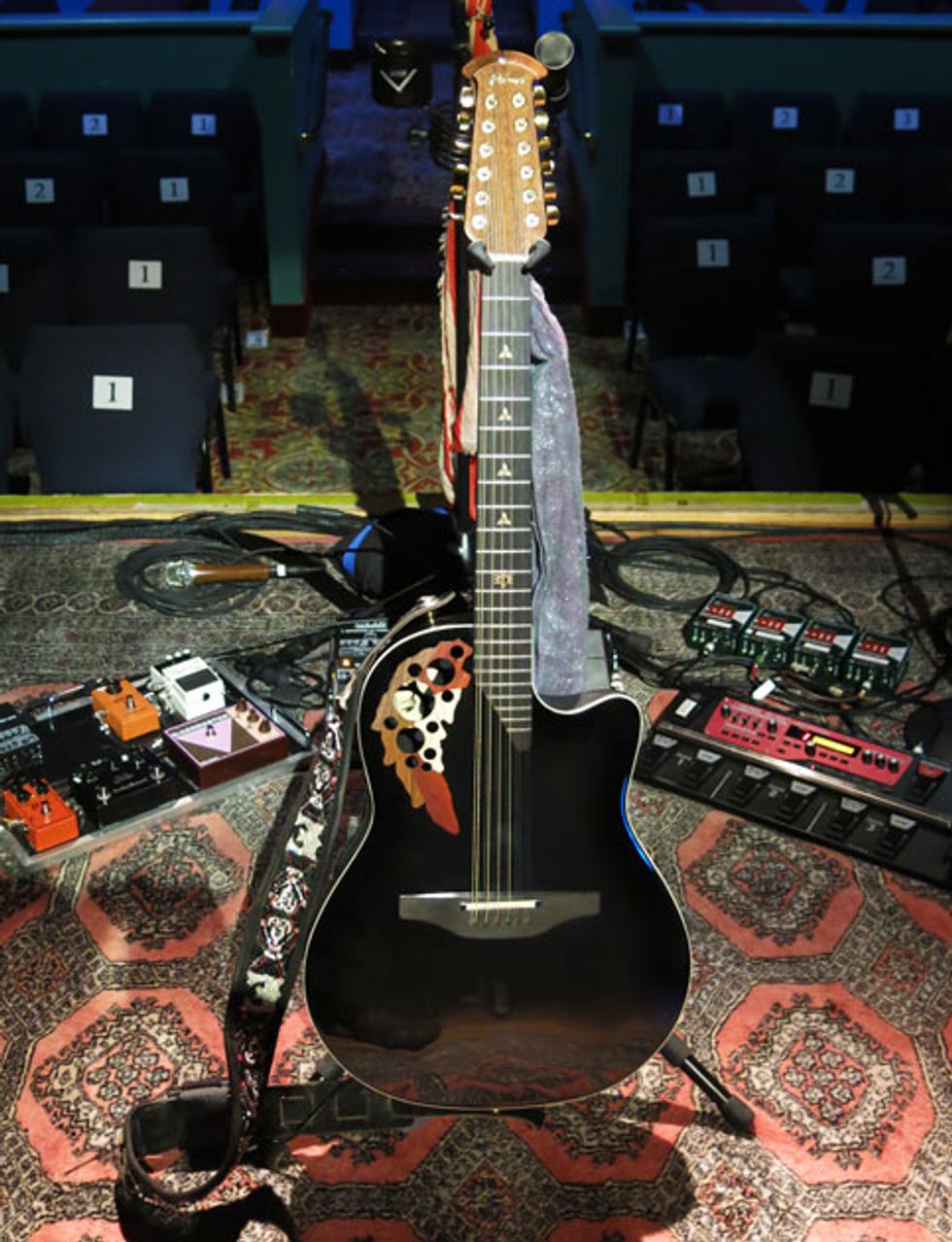
Melissa Etheridge Signature 1598-MEII 12-String Ovation
This is my No. 1 because it’s like my favorite pair of shoes. If I’ve got to walk a mile, that’s the pair of shoes I’m going to pick. I write on the Ovation—it’s just like a piece of me and it has been for so long. I’ve played Ovations since I was 14. Oh my god, that’s almost 40 years. I don’t even know how many I have [laughs]. I’m awfully hard on them and that’s one of the reasons I like them—their durability. What I count on from my 12-string is that it’s electric-acoustic, easy to plug in, I don’t get feedback, I can EQ it, I can make a big humungous sound with it, and I can hit it on the front and back and beat it—it’s almost a percussive instrument. I always hear the drums in my head so it comes out that way on the 12-string.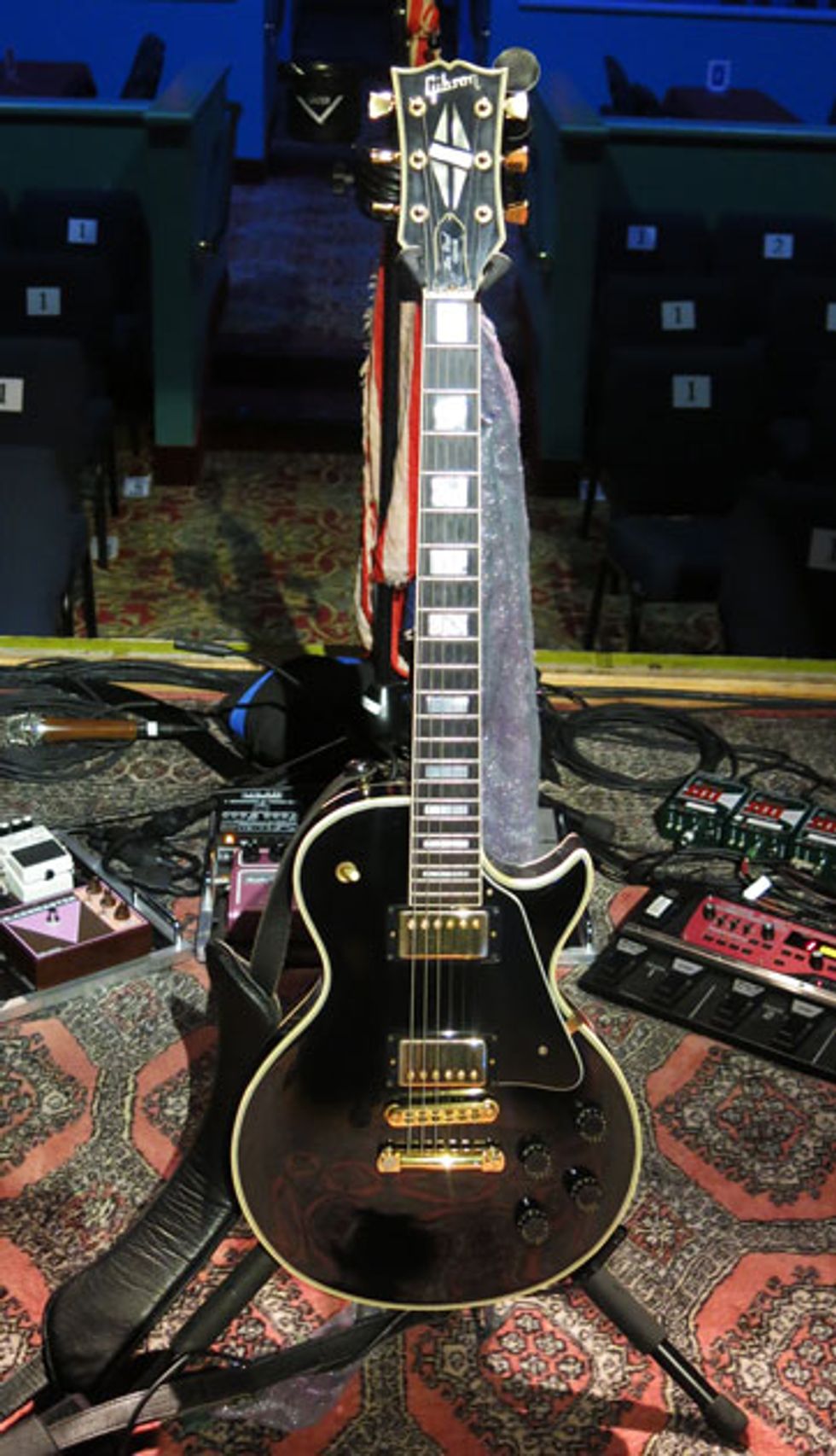
Gibson Custom ’82 Les Paul
Man it’s just so sweet, it’s one of my favorites. It has little handles on the tuners that were just from that one model year. I had a custom 1974 when I was in high school and it was so heavy that I traded it in for a Strat. This one isn’t as heavy. You can’t beat the sustain and you can’t beat the smoothness of it ... I just love it. I play it on “I’m the Only One” and I used it a lot on the new album—most of the electric guitar on the album is my Les Paul.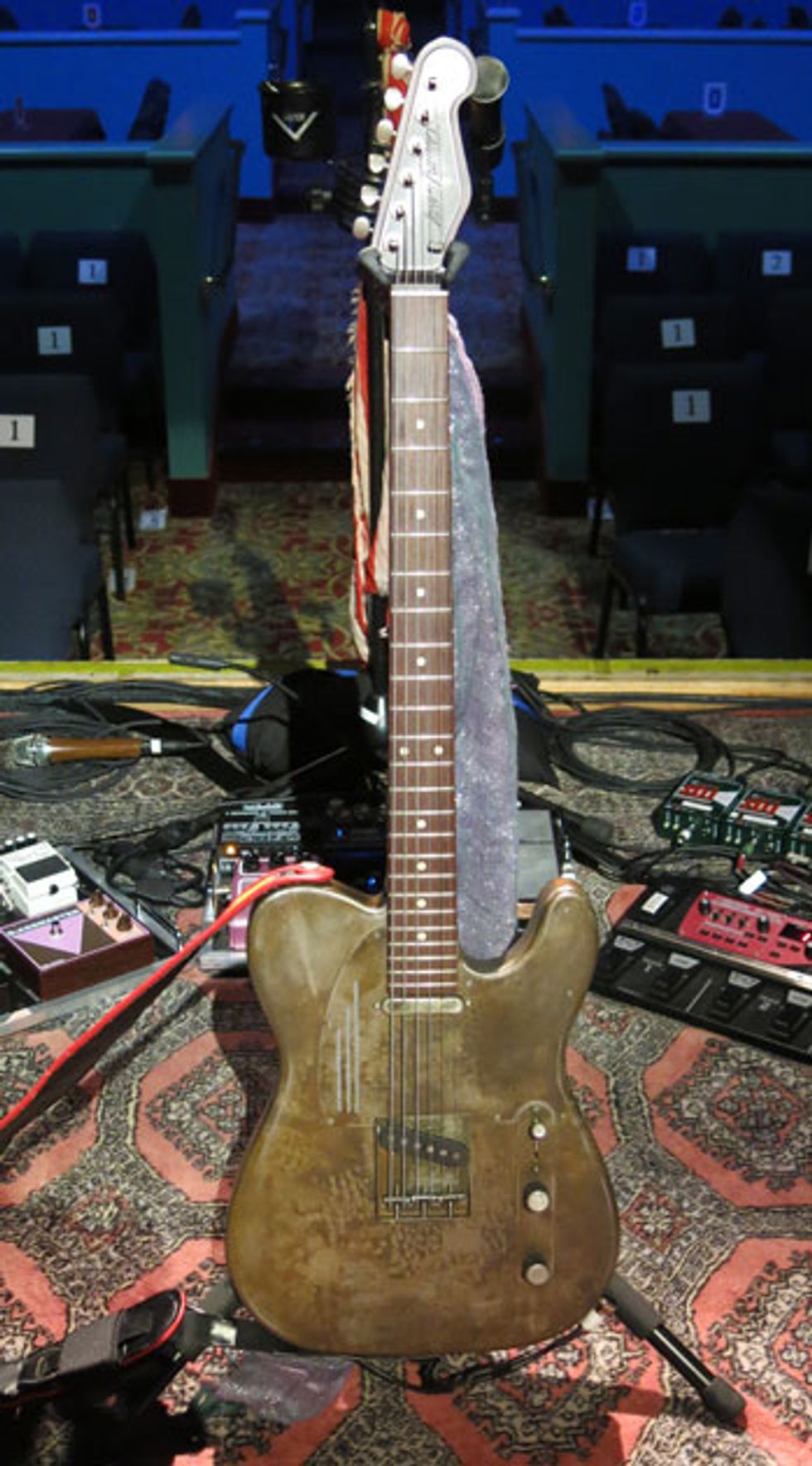
James Trussart Baritone
James Trussart makes such nice guitars. The neck on that thing, I think it’s rosewood, it just feels ... I love to touch that guitar, it has an energy you can feel. I bought it because on my last album, 4th Street Feeling, I wrote “The Shadow of a Black Crow” on a borrowed Jerry Jones baritone. So when I was looking for a baritone to play that song, my bass player Brett Simons recommended a Trussart. I’ve always admired his guitars as art, and when I plugged it in I thought, “This is an incredible sound and an incredible instrument.”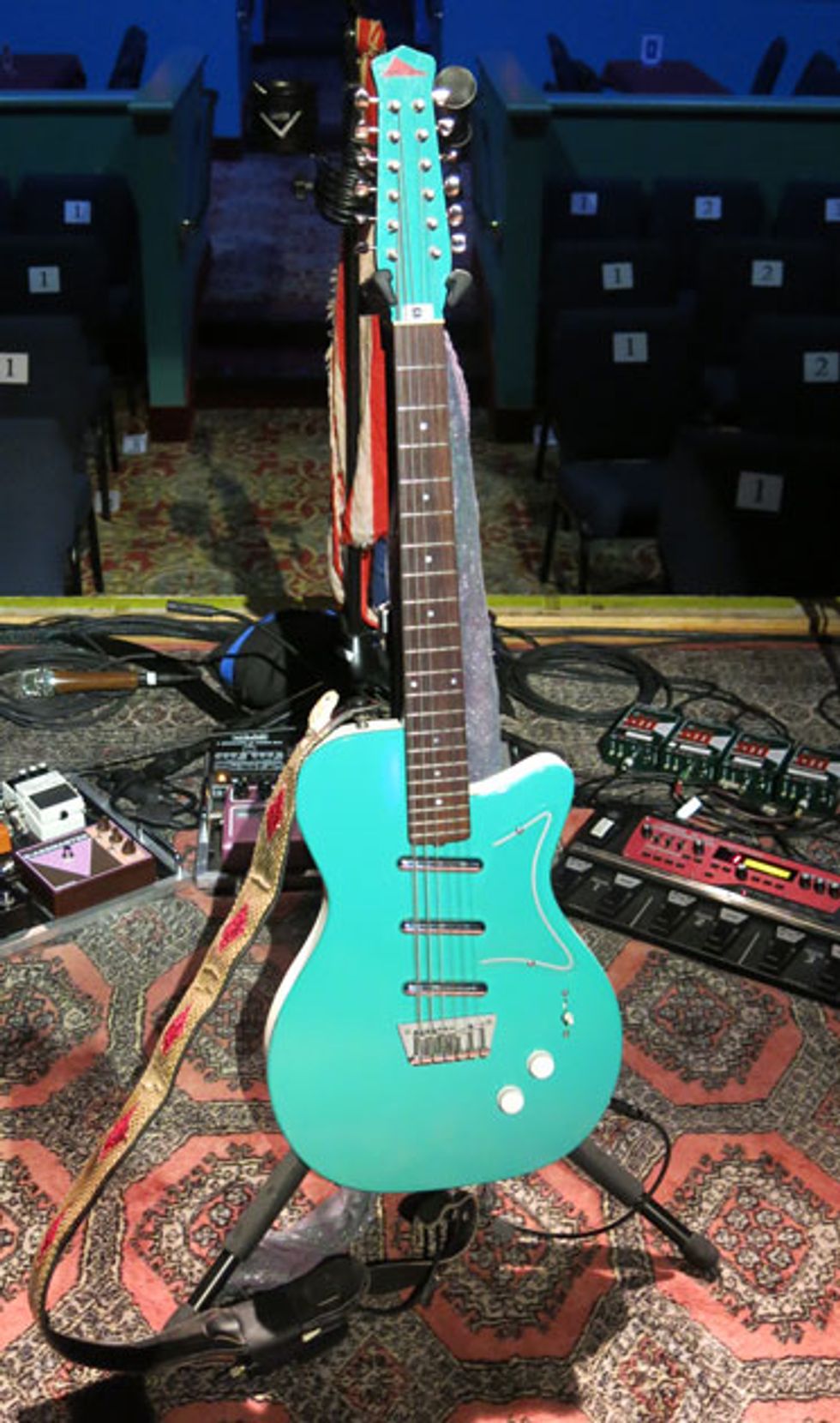
Jerry Jones 12-String
I’m kinda crazy about all 12-string guitars. I’ve gone a little nutty about it and that’s okay, that’s what I do. I’ve found that with the Jerry Jones, I can get a tone that’s not harmful. Sometimes on a 12-string electric, you can’t use it like a rhythm guitar, because it just eats up all the midrange and there’s no room for anything else. The Jerry Jones has a tone to it that is pleasant, and then I can bang! I can throw on a little distortion and I can actually play lead on the 12-string, which people go nuts for because it’s a sound they aren’t used to. It’s like a mandolin, but not. “Chrome-Plated Heart” is usually what I play on the Jerry Jones.YouTube It
Watch at the 11-minute mark as Melissa Etheridge puts her Jerry Jones 12-string through its paces on “Chrome-Plated Heart” during this full set at the 2013 Telluride Blues & Brews Festival.
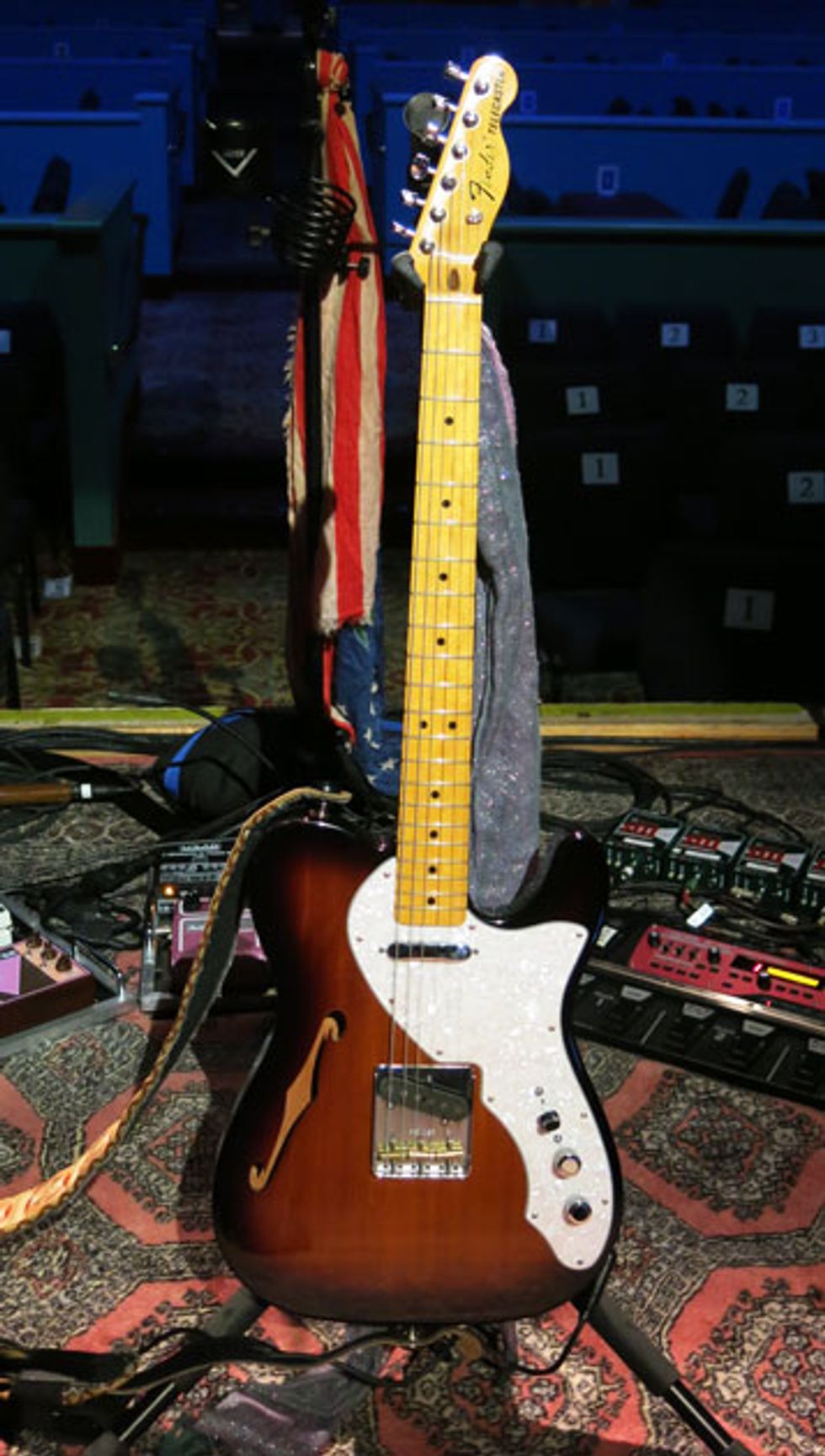
Custom Shop Fender Thinline Telecaster
I can’t remember the year of this guitar, I’m so not like a boy—they can recite the serial number to you, I can’t do that. This guitar is very rich, and when I want a clear tone, I use this Tele. It’s a replica of an older original custom Tele that I retired from the road. It belonged to a jazz player and has the ashtray on the bridge, and the dudes on their break used to go in the alley and smoke and put their cigarettes out on their guitars. My original has stains where he used to stub out his cigarettes.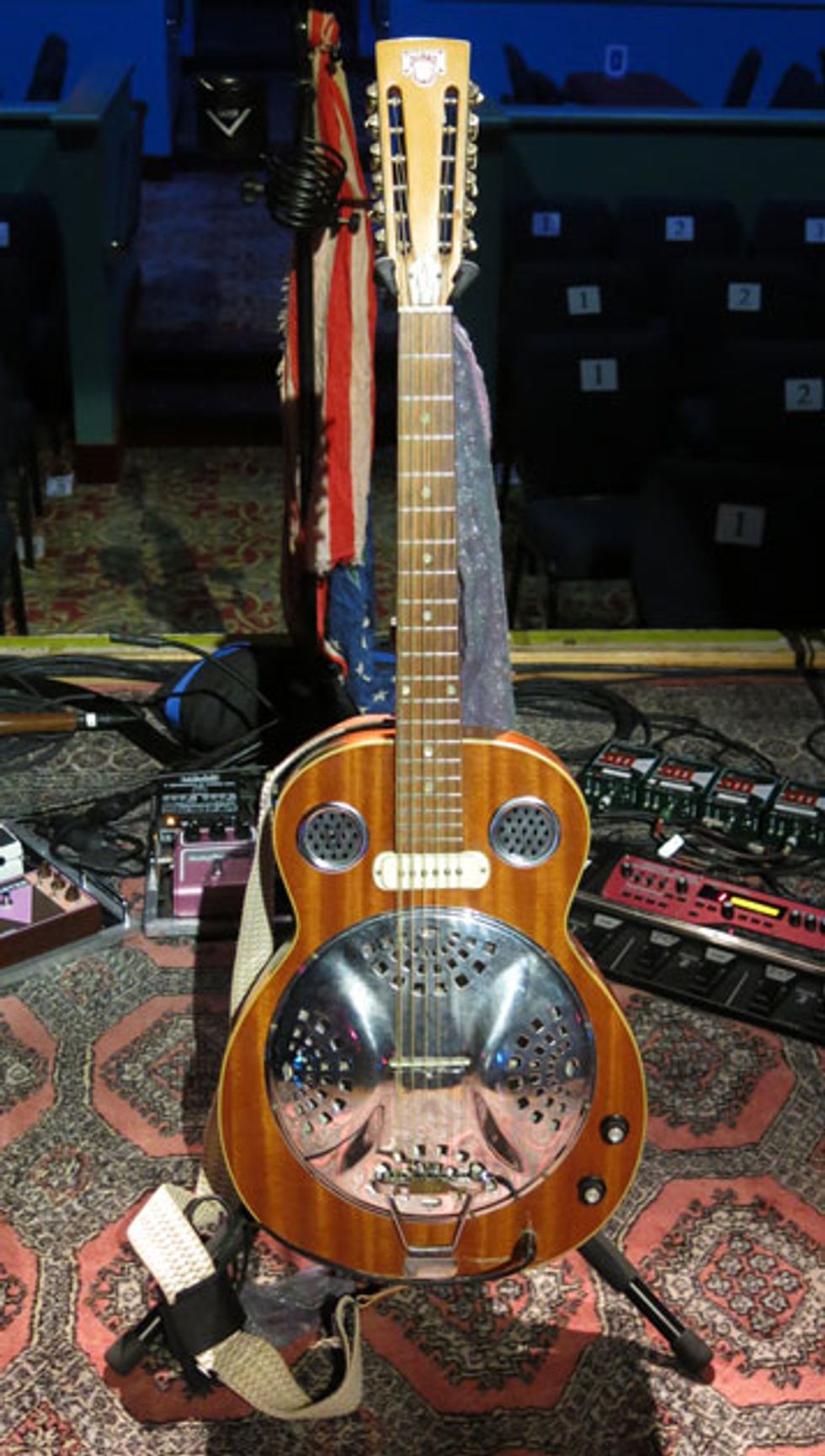
12-string Dobro
I’m going to have to retire this thing after this solo tour because it’s just barely hangin’ on! I bought it in the early ’90s at the Rose Bowl flea market in Pasadena. I used to always check out guitars at flea markets. I opened this up and it was a 12-string. I had never, ever seen a 12-string resonator! It was a little crunched up, but I think I got it for $300 or something. I did some research and found out that National only made it for one year and there was no market for it. I took it out this year because I’ve just started playing more slide. It’s been a natural progression.I’m using it now on the end of “The Shadow of a Black Crow.” It’s in open B and tuned really low—it’s like “BWAAAAH” [laughs]. It’s cool. I detune it, it rattles around, I play the slide, I put a little bit of distortion on it, and people just go crazy. On the new album, all the slide you hear is this resonator.
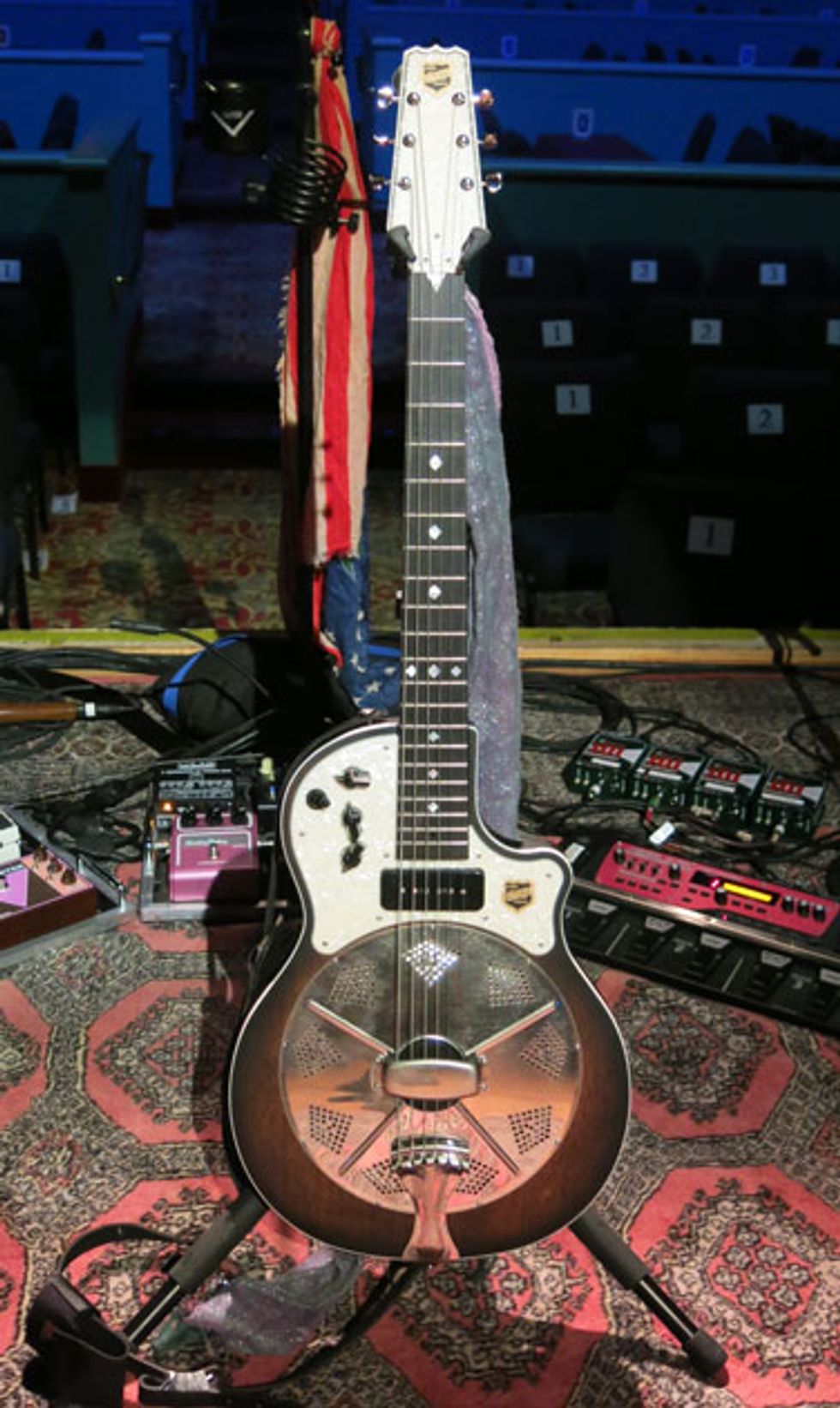
National Reso-Phonic
This is the latest guitar—I bought it just a couple of weeks ago. I bought it because I have to retire the 12-string Dobro and I needed something solid for the road. I bought a Dobro from Norm’s [the legendary L.A. music store, Norman’s Rare Guitars] and brought it out on the road and was like, ‘What was I thinking?’ It wasn’t electric. So I traded it back in for this 6-string resonator.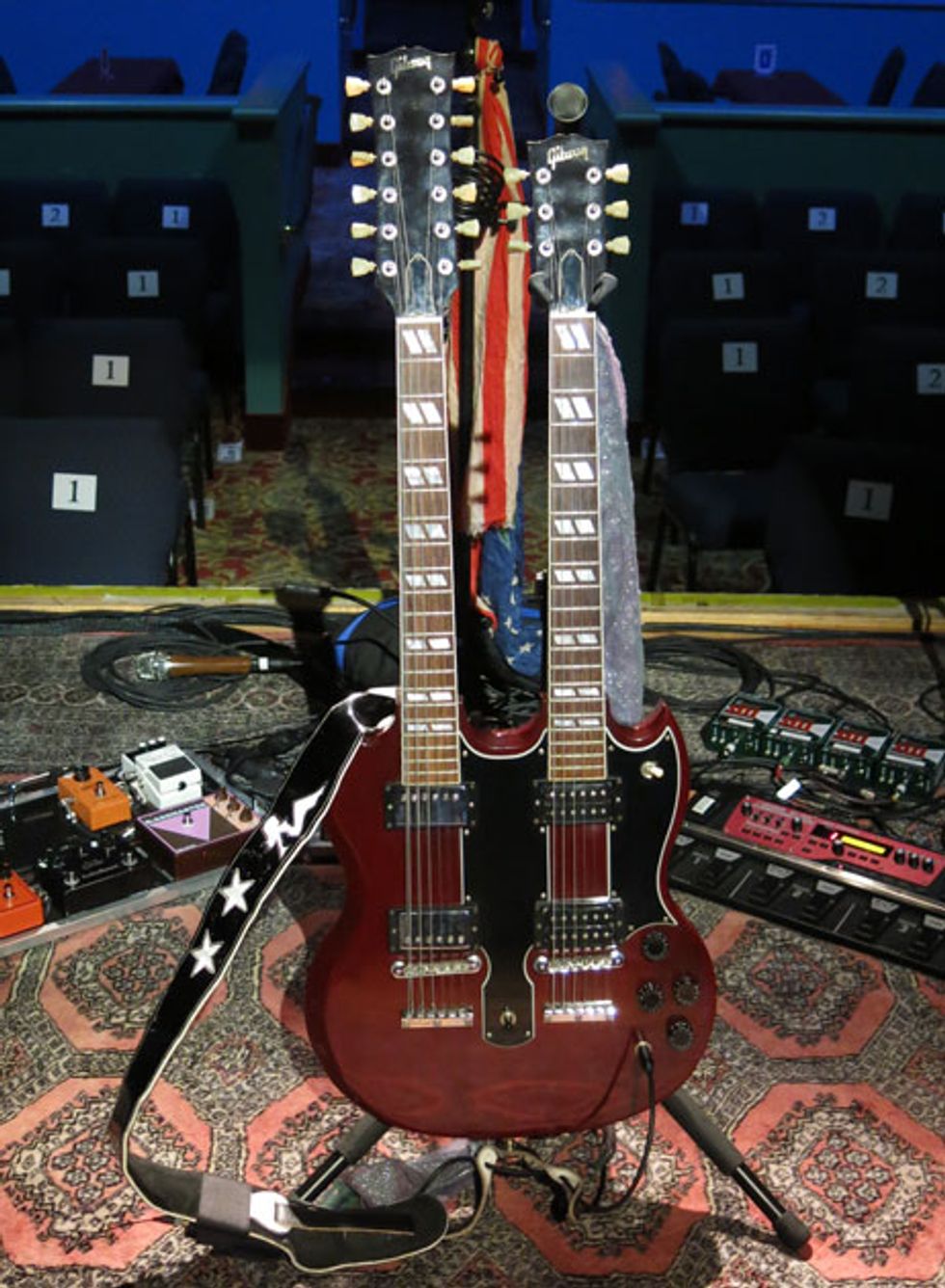
Gibson SG Doubleneck
This was from when they started making the reissues in the ’90s. Of course, I wanted to be a purist and get one from the ’70s, but the ’90s version fixed everything that was wrong with the ’70s model—and that’s great. I was on tour in Sioux City, Iowa, headlining a big festival. It was me and Sublime. A music conservatory there was hosting a guitar show. I thought I’d just go visit it and I saw this doubleneck … and you know me and 12-strings.I knew I’d be doing a solo thing and I thought, “That’s just perfect.” It’s heavy as a mother—insanely heavy. I just play it one song at a time. At soundcheck where we run through something a couple or three times I’m like, “Okay, I’ve got to take this off. This is killing me!”
It is such a phenomenal sound—the sound and the quality of that guitar amazes me. In the solo show, I’ve reworked a lot of the ballads. I’ll play “Royal Station” or “Don’t You Need” and other ballads where I’ll sing and play on the 12-string and loop that and then I’ll play lead parts on the 6-string on top of it.
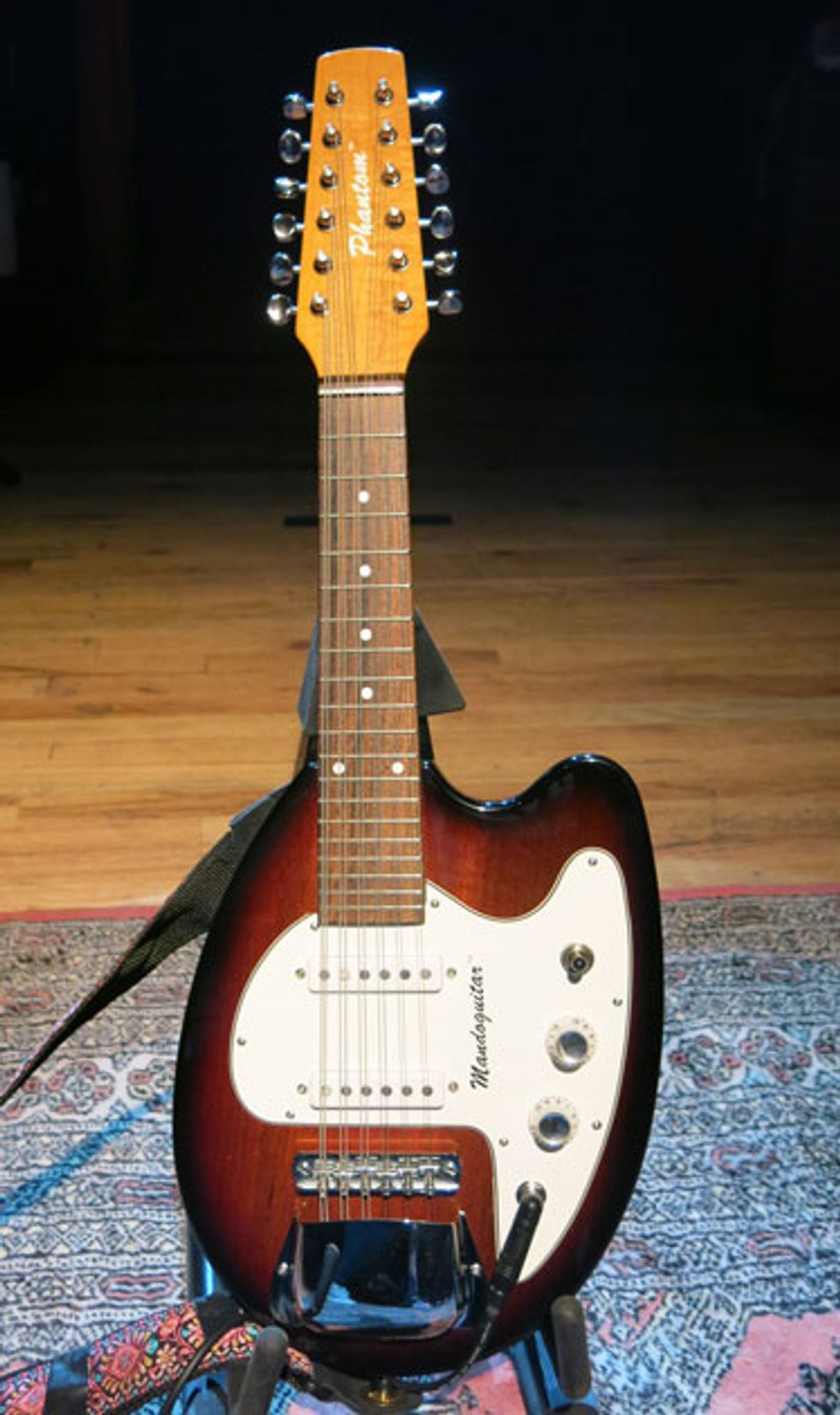
12-string Phantom MandoGuitar and Boss Loop Station
The MandoGuitar is fun to play on the solo tour. On “If I Wanted To” I loop my 12-string Ovation and then pick up the MandoGuitar. It’s cheating—it’s not a real mandolin. I haven’t used it on an album since [2010’s] Fearless Love when I did the song “Only Love.”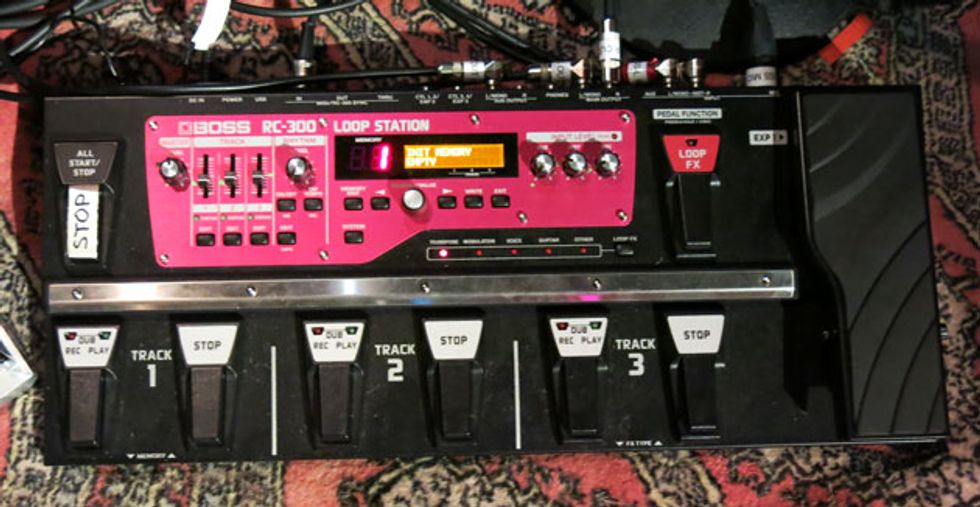
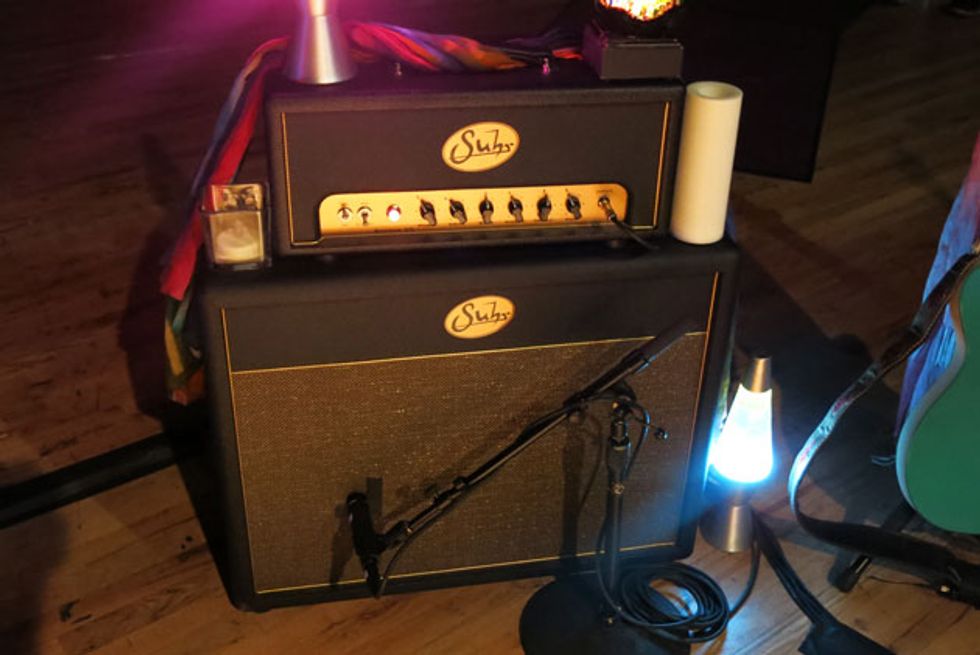
Suhr Badger 35
Marc Vangool works with me and my guitars and pedals. He’s my tech when I can have him, but he’s very much in demand. He really guided me in the last few years to be a better guitar player. And Peter Thorn: He is the reason I’m a better guitar player today. He was so instrumental and he was so kind. He was such an amazing and gentle teacher. He introduced me to the Suhr people. My Suhr amp has such a great sound at low volume, which onstage ... that’s golden.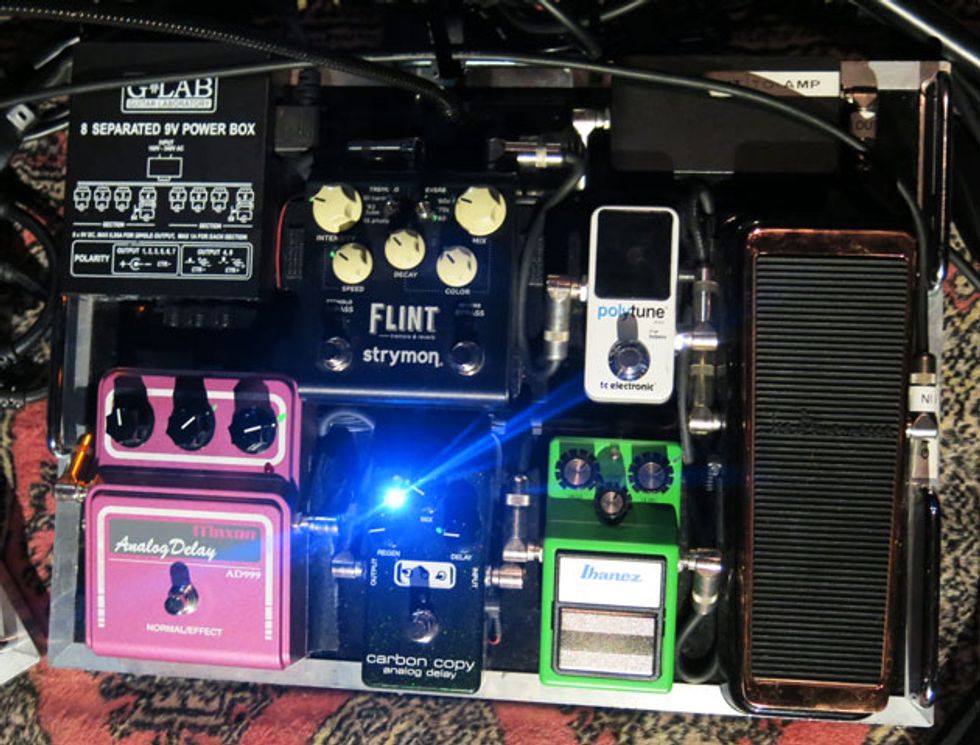
Pedalboard 1
My pedalboards are pretty straightforward. I’ve got the Bonamassa wah, I love that. The tones you can get from it—just as a boost, not even using the wah part—are amazing. I usually use it as a wah, but if I really need one more push, I’ll do that. What I do love is the Tube Screamer. And that Maxon, if you love just a beautiful analog delay, it adds such a nice effect.I use my other delay [MXR Carbon Copy] when I want a slapback. I’ve got a tremolo reverb pedal, the Strymon, but I’m not a guitarist that’s doing all the crazy stuff. I’m very organic in my sounds. A lot of lead guitarists program everything in, but I just can’t go down that road—I’m just not that girl. I want my pedalboard to be a useful tool in the moment where I go, “Tonight I want this sound,” so there is freedom and choice in the moment. [Board #2 houses a G Lab Power Supply, Strymon Flint, TC Electronic PolyTune Mini, Dunlop JB95 Joe Bonamassa Wah, Ibanez Tube Screamer, MXR Carbon Copy analog delay, and a Vintage Maxon AD-999 analog delay].
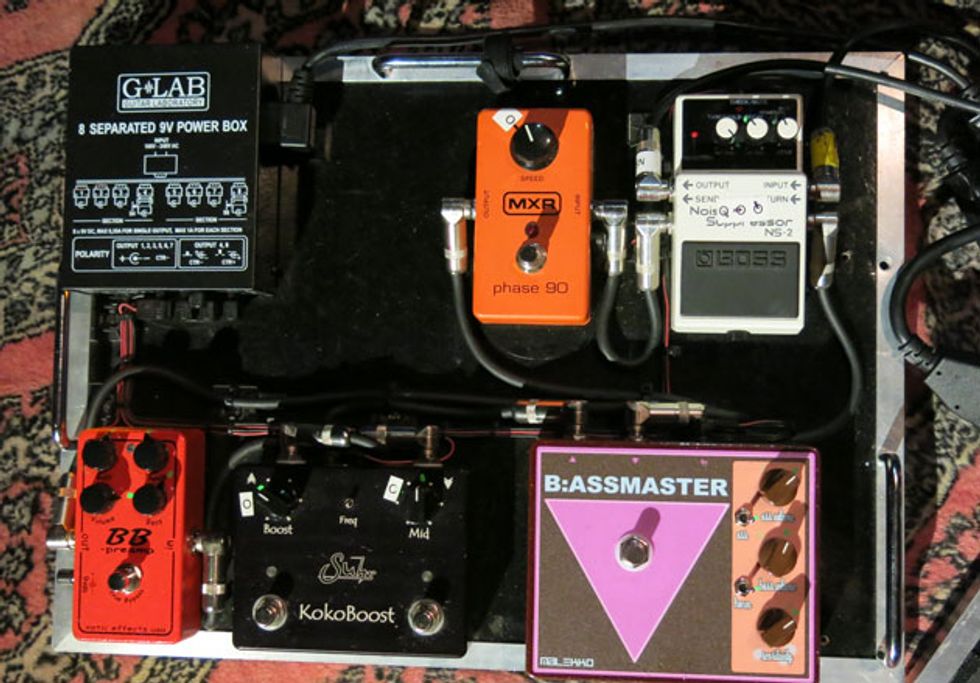
Pedalboard 2
I have different distortions because the Malekko and the BB Preamp are so loud I don’t use them on the solo tour—they obliterate everything. I use the Koko Boost almost every time I pick up the guitar. [Board #1 is home to a G Lab power supply, MXR Phase 90, Boss NS-2 Noise Suppressor, Xotic Effects BB Preamp, Suhr Koko Boost, and a Malekko B:Assmaster.]This re-imagined classic octave fuzz is mean, massive, and musical.
What is it about octave fuzz? Hendrix-based hero associations aside, there’s something else that draws us in. It’s a sound that’s a bit filthy, a bit decadent, tough, chaotic, and exploding with sass—like the electric feel of strutting big city streets in the wee hours. Like all rich and intoxicating things, octave fuzz is best in moderation. But used with discretion and timing, it’s one of the most distinctive ways to drive a riff or solo home.
MXR’s La Machine is as mean and heavy as a good octave fuzz should be. But there’s also a civility (and we use that word loosely) that makes it very rewarding and a bit more user-friendly—an octave fuzz that works as well for the neophyte as the experienced octave fuzzist.
More Miniscule Machine Gun
As the name coyly suggests, La Machine is inspired by the Foxx Tone Machine, a (literally) fuzzy, flocked octave-fuzz box that appeared at the height of the early-’70s effects boom. While not as renowned as the Octavia or Univox Super-Fuzz, many would argue the Tone Machine was more versatile and sounded every bit as good as those icons.
Because MXR flipped the PCB on La Machine, it’s hard to know what means they use to approximate the Tone Machine’s combination of fuzz corpulence and octave wail. But the control set on the compact La Machine is virtually identical, save for a small push button for the octave function that stands in for the Foxx’s side-mounted toggle switch. For Tone Machine devotees that kept space-hogging originals off their boards, MXR’s smaller path to comparable tones will be a godsend.
High-Octave Hustle
Like a lot of fuzz seekers, I always enjoyed the Tone Machine’s two-headed versatility. Again, La Machine excels at this duality. The basic fuzz is huge and more Big Muff-like than the fuzz on the original Tone Machine. But it’s varied, responsive, and wide-ranging enough to be the only fuzz on your board.
Ratings
Pros:
Smooth and forgiving for an octave fuzz. Fuzz voice is huge and versatile by itself.
Cons:
Octave bypass button is small.
Tones:
Ease of Use:
Build/Design:
Value:
Street:
$139
MXR Custom Shop La Machine Octave Fuzz
jimdunlop.com
The fattest fuzz tones are abloom with harmonics, exhibiting a high-caloric feel that evokes a cross between ’70s and Sovtek-era Muffs, but with a little less compression and slightly more immediate pick response. La Machine can also generate mid-’60s-style insect buzz with uncommon sustain when you set the tone and distortion controls just right. Few fuzzes cross over from Beck-era Yardbirds to desert rock excess with such ease.
Like the basic fuzz, the octave effect is very adaptive, malleable, and responsive to input from the tone and distortion controls. Dialing back the distortion highlights how good the octave signal can sound without the low-end support of the fuzz. In this environment, an octave signal can sound stark naked, but La Machine exhibits a singing quality that players will find more forgiving than what’s offered by typical octave boxes.
With the fuzz and octave raging at once, La Machine is monstrous. It can add extra tonnage to Band of Gypsys leads or deliver you to stoner rock heaven. This is one of the smoother pairings of octave and fuzz you’ll encounter too. And though you still get all the glorious, glitchy phase cancellations and ghost harmonics you want from an octave fuzz, there’s a smoothness to chords and a touch sensitivity that you don’t hear and feel as readily in other octave units.
The Verdict
La Machine is a great octave fuzz for players who find the Octavia or Super-Fuzz a little too hectic and tough to wrangle. It’s smoother than those units and the fuzz is more in line with players who like a little more gain, more Muff-like flavors, and a more modern touch. And it carries a real cool price for a MXR Custom Shop pedal. Don’t wait too long though—word is, they aren’t making many.
Watch the Review Demo:
This compact analog delay bubbles over with impressive modulated echo tones.
Seymour Duncan is just about the biggest name in aftermarket pickups. That focus doesn’t reflect the bounds of the company’s know-how, though. The company has built guitars, amplifiers, and a bunch of effects over the years. They’ve reenergized their pedal-building efforts over the last year, and one of the latest products from the Santa Barbara workshop is the Vapor Trail, an analog bucket-brigade delay that also incorporates a chorus-like modulation section. Despite its small size, it sounds huge.
Undercover Powerhouse
The Vapor Trail is a pretty simple affair on the surface, but the compact control set gives you a lot of sound-shaping power. The delay controls are pretty conventional, with knobs for mix, repeat, and delay.
The clear delay knob, however, serves a cool double function by working as a delay rate indicator via a flashing blue LED that illuminates the knob. The two smaller rate and depth knobs control the modulation section.
Input and output jacks are located on the crown of the box and a wet insert jack is mounted on the left side. This function can be used in multiple ways. You can attach an expression pedal to alter the delay repeats, create a wet parallel loop with a Y-split cable, or run the purely wet signal out to another amplifier/input.
Ratings
Pros:
Warm analog delay tones. Surprisingly versatile modulation functions. Wide range of sounds and textures.
Cons:
Modulation effect isn’t that useful on its own.
Tones:
Ease of Use:
Build/Design:
Value:
Street:
$150
Seymour Duncan Vapor Trail Analog Delay
seymourduncan.com
No Smokescreen Here
The main attraction of the Vapor Trail may be the ability to blend in modulation, but the delay is excellent on its own. And though the 15 to 600 ms delay range isn’t as expansive as what you get from digital units, the Vapor Trail covers classic analog delay textures with ease. You can dial up slapback tones readily with the repeat and delay around 9 o’clock—just make sure to roll off the modulation rate control, unless you want that, “Who spiked the punch?” feel—a trick the Vapor Trail does very well.
Though the mod can also run alone by turning the delay time to zero, it’s less effective by itself—sounding mostly like a mild chorus. Mixing the modulation with delay, however, can produce cosmic soundscapes, subtle tape wobble-like modulation, or approximate the chorus/vibrato textures of a Deluxe Memory Man. Spacious, Uni-Vibe-like Dark Side of the Moon colors surface with the rate and depth around noon. Slowing the rate way down turns chords into a ghostly, swirling earful—especially when you nudge the modulation depth and dial in a long delay. Shorter delay times give the pedal a Leslie-like resonance that sounds great with a really wet mix—a setting that can be unforgiving to delays or modulations with thin voices.
The Verdict
You can extract a surprising range of sounds and effects from the Vapor Trail. It invites tweaking and experimentation. But at its foundation, the Vapor Trail is a really solid analog delay with a deep range of voices. The wet insert jack is cool little perk that adds additional value and tweakability to a package that already does a lot for a little analog unit—especially considering the very reasonable $150 price tag.
Watch the Review Demo: